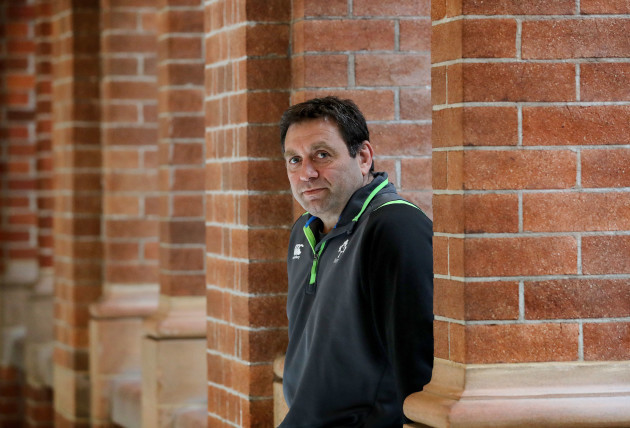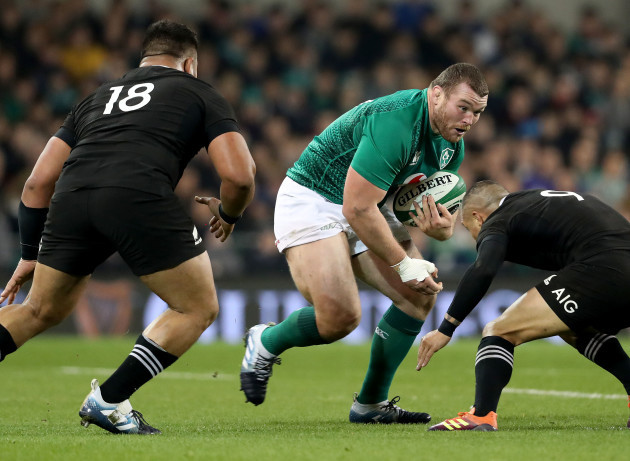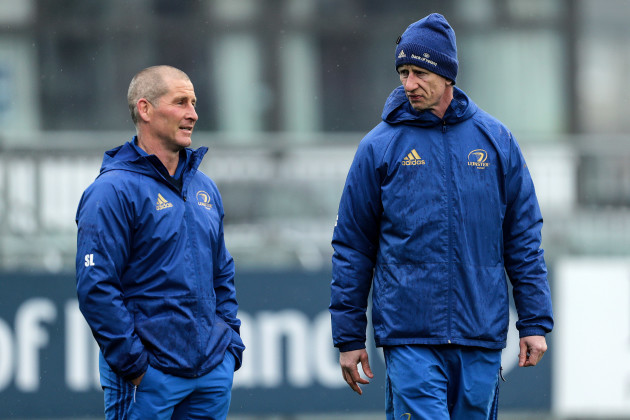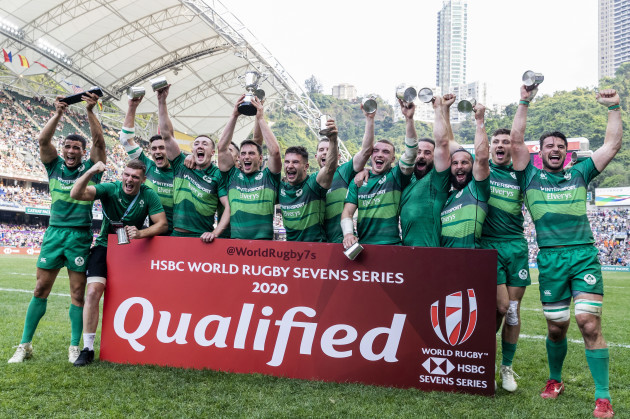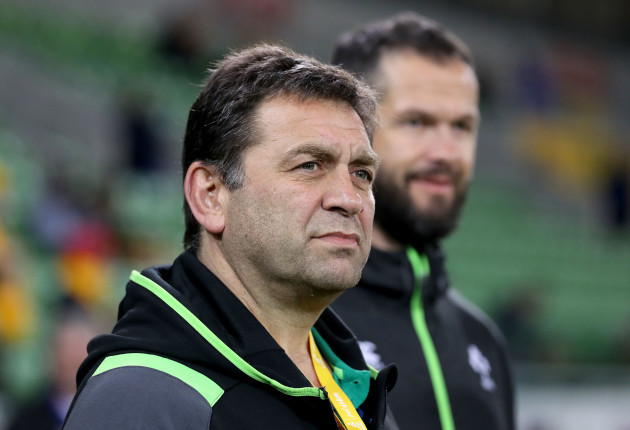NO PRESSURE, JOE.
But with Irish rugby appearing to be in good health, David Nucifora – who is essentially the boss of the IRFU – is hoping Ireland can break the glass ceiling and reach a first-ever World Cup semi-final in Japan later this year.
Nucifora, whose official job title is performance director, has just signed a new three-year contract with the union and hopes to see Joe Schmidt conclude his brilliant reign as head coach by guiding Ireland into the final four of the global tournament.
“We’ve got to get to a semi-final and obviously, we want to go further than that if we can,” said Nucifora at an end-of-season, state-of-the-nation update in the Aviva Stadium yesterday.
“I think we’d be kidding ourselves if we thought that anything worse than a quarter-final is going to be good for us.”
Ireland will need better luck with injuries than in 2015 and though this year’s Six Nations was a bitter pill to swallow, Nucifora said he backs Schmidt and co. “every day of the week” to learn from their shortcomings in the championship and deliver in Japan.
A first World Cup semi-final during his tenure would be a major green tick for Nucifora’s legacy whenever his time with the IRFU comes to an end, something that won’t happen before 2022 after extending his deal.
Nucifora joined the union in the newly-created position in 2014 and, while admitting that no system is ever perfect, he is confident that Irish rugby is in good shape as we look towards the World Cup.
The former Wallabies hooker’s role is wide-reaching but one of his key goals since arriving has been to increase player movement between provinces for the betterment of the national team.
There has been resistance and anger at times, of course, but it’s one of the things Nucifora believes has been a success in his time with the IRFU.
“It’s been a really interesting journey to see where we started and where we’re at,” said Nucifora. “I think we’re at a position now where all we really are is facilitators of a system and the players take over.
“We’ve made people aware that this is an option for them and when you’ve got guys like Jack McGrath [who will join Ulster from Leinster next season] making a decision for himself to say, ‘This is best for me, I’ve going to do this, I’m going to move,’ the system is working and we’ve actually managed to pique players’ awareness that it’s an option. I think the game will only be stronger for that.”
Nucifora cited Munster’s Bill Johnston shifting to Ulster this summer and Cian Kelleher returning to Leinster after three seasons with Connacht as other good examples while pointing further down the chain to academy level too.
“If they all can’t fit in one region, then there are certainly players looking to take opportunities elsewhere and we’re more than happy to facilitate that.”
Nucifora rejected the notion that Leinster have been weakened by losing players to other provinces – Joey Carbery, Jordi Murphy and McGrath are examples – stressing that Leo Cullen’s squad could have beaten Saracens in this season’s Champions Cup final, “without a shadow of a doubt.”
He also disagrees with those that argue that provincial identities will be diluted by more and more player movement.
“I remember sitting here a few weeks back watching Leinster and Ulster [in the Champions Cup quarter-final],” said Nucifora. “I thought, ‘Bloody hell, what a fierce game.’ They were ripping into each other, so the games don’t tell me that.
“The crowds, it was full here, full at the RDS [for Leinster v Munster in the Pro14 semi-final] on the weekend, it doesn’t seem to be making any difference in those particular areas.
“At the end of the day, we’ve got to keep making sure that we get our best players out there and playing and that’s how we get better.”
Nucifora was delighted to see all four Irish provinces qualify for the Champions Cup next season, noting the “significant uplift” in the performances of Ulster and Connacht.
The IRFU has worked hard to bring experienced coaches into the country and Nucifora was “particularly pleased for Andy Friend and the job he’s done out there in turning Connacht around after a difficult season the year before.”
He noted too the influence of Dan McFarland, who the IRFU had to buy out of his Scotland contract, in Ulster.
There was semi-final disappointment in two competitions for Munster again and though the IRFU are eager to see them take the next step – as well as bring experience into their coaching staff – Nucifora pointed out that most teams would love to be at that level.
He lauded Leinster’s “outstanding achievement” in reaching the Pro14 and Champions Cup finals for the second consecutive year under Stuart Lancaster and Leo Cullen.
“For me, the secret lies in the quality of coaching the provinces have at their disposal,” said Nucifora. “We need to keep concentrating on the quality of coaching because it does make all the difference.
“It’s not always about buying new players in. When you ask, ‘How do you make your squad better from year to year?’ people immediately say, ‘We’ve got to get new players’.
“I’d be a great believer that the answers lie in making the players you’ve got better first and that’s only going to come from the quality of the coaches.”
Having spent much time working on what he calls the “player pathway” in recent years, Nucifora took great satisfaction in the Ireland U20s’ Grand Slam under Noel McNamara this year and hopes to see them shine in next month’s World Rugby U20 Championship in Argentina.
Either way, the IRFU are convinced this U20s squad will provide “another cluster of players” who will advance up the ranks in the coming years.
Nucifora also pointedly stressed the value of the Ireland Sevens programme, which he has pushed strongly since arriving, re-launching the dormant men’s squad in 2015.
That journey has culminated in the men’s squad qualifying onto the World Rugby Sevens Series for next season, while Nucifora stressed the value of sevens for a number of reasons – academy players gaining experience in sevens before earning senior deals, players who don’t advance beyond their academy contracts staying in the system, and players who don’t make the academies getting a shot at high-level international rugby.
“The programme has many uses for us and with only four professional teams, having another team competing at such a high level is going to actually continue to be a massive benefit for us.”
The Ireland Women’s Sevens have had a best-ever season, including their first semi-final on the Series at the Sydney Sevens, with the hope being that they and the men’s squad can now secure qualification for the Olympics in Tokyo next year.
“If we can get Olympic qualification in one or both, it will be an enormous boost because we also want to be using the sevens programme as a flagship to be able to attract more people to play the game of rugby.”
However, despite the successes, Nucifora said the IRFU has no intention of boosting the “full-time” sevens contracts beyond their current value of €18,000 per season.
“No, what they were doing last year would equate to the same as what they were doing this year,” said Nucifora. “So they were full-time this year leading into the series and next year they’re the same.
“Their contracts are the equivalent of a development contract, roughly, and we think that’s where it equates into the game because it is a development programme for us and they’ve been put onto that level of contract and those contracts are the same levels as what the women’s sevens players are on.”
Meanwhile, with women’s sevens rugby potentially set to move onto the next level with Olympic qualification, women’s 15 rugby in Ireland is in a worrying state, with Ireland Women now ranked 10th in the world after a miserable Six Nations campaign this year.
Nucifora rejected the suggestion that 15s rugby is suffering because of the focus on sevens, underlining again that “it’s one women’s programme,” but accepted that there is serious work ahead to grow into a competitive force again in 15s.
The IRFU believe that managing the workload of what they feel is a small pool of players capable of playing Test rugby between now and the World Cup qualifying tournament next year is vital, while they work longer-term to grow the number of female players in Ireland.
“You’ve got to crawl before you walk and we acknowledge that the game needs a lot of growth and we’re totally committed to growing the game,” said Nucifora.
Another black mark some hold against Nucifora’s name is the status of the All-Ireland League, with many believing the Australian has no regard for the club game in Ireland – although he stressed that overseeing club rugby is not within his remit.
Nucifora denied that the recent Cara Cup in the US, to which the provincial A teams travelled and took key club players away at an important time of the season, was a deliberate insult to the AIL clubs after they rejected an IRFU proposal to restructure the leagues last year.
With the clubs having resisted the IRFU’s desire to create two top divisions that would bridge the gap between the amateur and professional games, Nucifora insisted that it is now up to the clubs to come back with a new proposal.
Further up the chain, however, Nucifora believes Irish rugby is in good condition ahead of that shot at a first-ever World Cup semi-final in Japan, and potentially more.
A new IRFU high-performance facility at the National Sports Campus is nearly completed and will be used during Ireland’s preparations for the World Cup, which kicks off in September.
Schmidt will move on post-Japan, but Nucifora is here to stay for the next era when Andy Farrell has the onerous task of succeeding the Kiwi as Ireland head coach.
“It’ll be different,” said Nucifora, “and all the things that Joe has done and left behind are not going to be lost, and that’s what we’ve really focused on.
“We’ve focused on how do we on build on this and we’re really confident that Andy is going to be able to build on what Joe has done.
“Now Andy’s a different man to Joe and he’s going to do it a different way, but one of the reasons that we recruited Andy was because, one, we believe in him as a coach and as a person, but also Andy was super keen to come here all those years ago because he wanted to work with Joe and he feels that he’s a far better coach for the time he’s had with Joe.
“He’s going to be put to the test when he takes over post the World Cup.”
Gavan Casey is joined by Ryan Bailey and Andy Dunne to look ahead to Saturday’s Pro14 final, look at whether Joey Carbery’s move has paid off and Jack Conan talks about how his body is holding up.:
The42 Rugby Weekly / SoundCloud
Subscribe to our new podcast, The42 Rugby Weekly, here:
